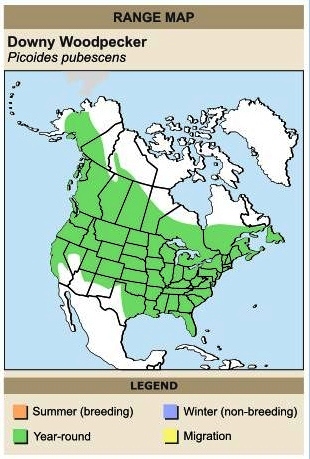|

The smallest
woodpecker in North America. Has a white back, black nape and black
wings with white spotting. Underparts are white. Face is white with
black stripes. Hindcrown patch is red. Tail is black with black-spotted
or barred white outer tail feathers.
Bill is black and short.

|
DOWNY
WOODPECKER
Picoides pubescens
PICIFORMES
Woodpeckers (Picidae)
Range and Habitat
Downy Woodpecker: Resident from Alaska across Canada and south throughout
the U.S. except in the southwest. Preferred habitats include woodlands,
parks, and gardens.
SOUND:
"pik"
The Downy Woodpecker uses sources of food that larger woodpeckers cannot,
such as the insect fauna on weed stems.
As the smallest North American woodpecker, the Downy can drill cavities
in dead trees or limbs that measure as little as 10 cm around. This
means that it can live in a wider range of habitat than can larger woodpeckers.
Males tend to feed in the tops of trees on branches that are small in
diameter, females feed midlevel and lower on larger diameter branches.
A group of woodpeckers has many collective nouns, including a "descent",
"drumming", and "gatling" of woodpeckers.
The Downy Woodpecker has a large range, estimated globally at 13,000,000
kilometers. It is native to Canada, the United States and Saint Pierre
and Miquelon. This bird prefers forest ecosystems that are boreal, temperate,
subtropical, or tropical, though it has been known to reside in rural
and urban areas. The global population of this bird is estimated at
13,000,000 individuals and it does not appear to meet population size
or decline criteria that would necessitate inclusion on the
IUCN Red List. The current evaluation status of the Downy Woodpecker
is Least Concern.
|